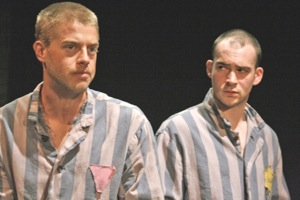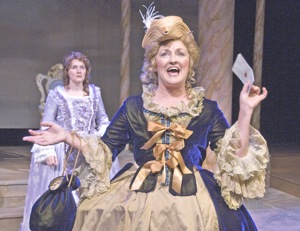Theater
To hell and back: from Hitler to Handel
Published Thursday, 12-Nov-2009 in issue 1142
‘Bent’
When Hitler had Ernst Röhm and the mostly gay leadership of Hitler’s own Sturmabteilung (SA) killed in June 1934 on the “Night of the Long Knives,” he could be said to be declaring war on gays as he would later mark Jews, gypsies, the handicapped and other “undesirables” for extinction. Though it is likely that Hitler considered the SA a military rather than moral threat, the purge of these gay leaders in the very gay-friendly city of Berlin augured ill for the homosexual community in Germany.
This is the backstory of Martin Sherman’s Bent, which focuses on the lives and fortunes of three gay Berliners: Rudy (Chris Buess), his lover Max (Michael Zlotnik) and Horst (Charlie Reuter). A co-production between Diversionary Theatre and ion theatre, Bent plays through Sunday, Nov. 22, at Diversionary and is co-directed by ion’s founders, Claudio Raygoza and Glenn Paris.
After the SA purge, Rudy and Max go on the run, but are captured and find themselves along with Horst on a train to Dachau. Rudy does not survive the brutality of the trip; Max later takes up with Horst.
Max is a coke-dealing hedonist with a talent for survival. He listens on the train when Horst describes gays as the lowest rung of the concentration camp caste system; in order to move up to a gold star rather than a pink triangle, he convinces his captors he is Jewish, even committing necrophilia to prove he is straight.
Horst seems to have a better handle on the historic moment in which he finds himself: as he doesn’t really consider survival a reasonable expectation, he doesn’t feel constrained to subtlety or denial.
Max and Horst are placed in different barracks at Dachau and given different work details. One of Max’s “deals” gets Horst assigned to the same Beckettian rock quarry, where their duty is to move a pile of rocks from one side to the other and then back again; the meaningless of the assignment is intended to drive them crazy. They are not allowed to look at each other, but every two hours they get a 3-minute break during which they must stand at attention. Their single act of defiance is to build a sexual relationship through sheer force of will during these breaks.
This is a fine and well-directed cast. Buess is excellent as young innocent Rudy. Zlotnik and Reuter are convincing and heartbreaking as they drag those rocks back and forth, though they look a bit too healthy in their shirtless scenes. Walter Ritter and Steven Lone are fine additions in smaller roles, and Chris Renda’s lighting is superb.
Bent isn’t a perfect play: you could quibble that it trivializes gays by asserting that those in concentration camps spent a lot of time thinking about sex when it seems far more likely that food was the major concern. And the ending is a bit more heroic than seems likely. But the depiction of brutality and the prisoners’ coping mechanisms make for riveting drama.
What sets Bent apart from other stories about the period is that it was the first play to concentrate the public mind on the Nazi treatment of gays. Sherman, whose characters are generally members of an oppressed minority, is himself a member of three: he is gay, Jewish and an artist.
Bent plays through Sunday, Nov. 22, at Diversionary Theatre. Shows Thursday at 7:30 p.m.; Friday and Saturday and 8 p.m.; Sunday at 2 and 7 p.m.; Monday, Nov. 9 at 7:30 p.m. For tickets, call 619-220-0097 or visit www.diversionary.org.
‘Joyful Noise’
You can’t find music much more joyful than Handel’s Messiah, and it would be difficult to find anyone in the English-speaking world who doesn’t know and love it.
But when playwright Tim Slover began to research it, he found that a combination of factors nearly scuttled the 1743 London premiere of this now-beloved masterwork, and thought the story would make a good play.
Joyful Noise was the result, and Lamb’s Players Theatre presented its wildly popular world premiere in 1999. Lamb’s later took it on to a successful off-Broadway run.
Now Joyful Noise is back at the theater’s Coronado location with a mostly different cast. It plays through Sunday, Nov. 22, co-directed by Robert Smyth and Deborah Gilmour Smyth.
German-born composer George Fredrick Handel (Robert Smyth) moved to London in 1712, where he quickly became the toast of the continent for his Baroque instrumental works, operas and oratorios. But he fell on hard times in 1737, with the death of patron Queen Caroline, wife of George II (Jim Chovick). Musical tastes were changing, Handel’s florid Italianate operas played to nearly empty houses, and the king declined to continue the patronage. Debts mounted.
One day Handel received a package from Charles Jennens (Nick Spear) – the libretto that would form the basis of the most beloved choral work in the literature. Handel wrote the score in 24 days – incredible to most, but par for the course for this prolific composer – and in 1742 premiered Messiah to wild acclaim in Dublin.
But back home in London, the Covent Garden premiere was thrown into doubt by church opposition to the presentation of a sacred text in a secular setting. Then there was the little matter of Handel’s casting of mezzo-soprano Susannah Cibber (Colleen Kollar Smith), a notorious fallen woman who had been convicted of an extramarital affair.
Add to this artistic catfights between Cibber and soprano Kitty Clive (Teressa Byrne), the librettist’s annoyance that Handel had added an “unnecessary” overture, Handel’s irascible temper and the king’s tepid support, and it’s not only a lively story but a wonder London ever heard the piece at all.
Lamb’s has another winner in this delightful story. Smyth‘s Handel is likable, even excitable; Chovick almost inspires sympathy as the politics-weary king, and Deborah Gilmour Smyth is terrific as scenery-chewing Handel supporter Mary Pendarves.
Smith’s Susannah and Byrne’s Kitty make a great musical contrast and a fine dramatic pairing, Smith’s smokier voice contrasting with the stratospheric notes of Byrne’s soprano. And and their catfights are a hoot fun to watch.
Jason Heil (as the bishop who wants Messiah stopped) and Paul Maley as Handel’s transcriber John Christopher Smith complete the major cast.
Joyful Noise is another triumph for Jeanne Reith, whose period costumes are elegant, opulent and just right. David Thayer’s simple set is effective, as are the sound by Deborah Gilmour Smyth and Patrick J. Duffy and Nathan Peirson’s lighting.
Everybody knows Messiah, but it’s likely that not many know the backstory. Joyful Noise is a great place to learn it.
Joyful Noise plays through Sunday, Nov. 22, at Lamb’s Players Theatre. Shows Tuesday through Thursday at 7:30 p.m.; Friday at Saturday at 8 p.m.; matinees Saturday at 4 and Sunday at 2 p.m. For tickets, call 619-437-0600 or visit www.lambsplayers.org.
|
|
Copyright © 2003-2025 Uptown Publications



